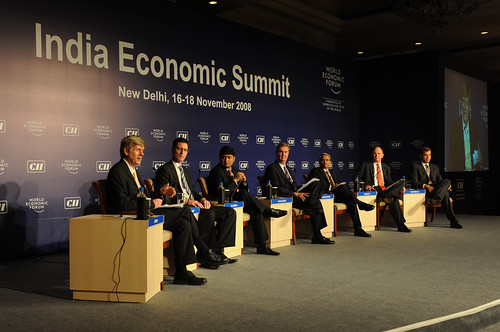So, technically the EU, Japan (and the US) are in a recession. The wave of global recession is in continuum right now. The crisis sparked by sup-prime mortgage crisis emanating from the US is getting harder to contain even in the face of rock bottom interest rates. This means monetary policy is getting ineffective. The last resort: call on the government! There has already been stimulus in the US, China, and some form of this sort in the EU. In its World Economic Outlook update for November, the IMF also argued that world output growth will fall to 2.2% and fiscal stimulus is the (only) option as monetary policy is not doing anything good right now. Already, India has lost $57 billion due to the current global crisis.
Now comes India, where businessmen surveyed by the WEF called for a fiscal stimulus package to uplift the quality of infrastructure and to prop up expected downslide in growth rate, which is forecasted to slide to 7% from 9% at present.
…“contra-cyclical fiscal stimulus” through the speeding the implementation of infrastructure projects already in the pipeline would certainly help economic growth to rebound.
More here.
Interestingly, some young Indian parliamentarians also argued that India now needs Obamas- not one, not two, but many!
“From our young sportsmen, our young businessmen, our young politicians,” said Rahul Bajaj, Chairman, Bajaj Auto; Member of Parliament, India, hopefully we are going to have more than one Barack Obama!”
New leadership and new ideas are desperately needed to address critical challenges faced by India. First among these, said Deepender Singh Hooda, Member of Parliament, India, is “the resurgence of divisions based on caste, religion and region.” Moreover, Hooda pointed out that, while India has enjoyed strong economic growth overall, certain sectors of society have been left behind and rising inequality is increasing class tension. Bihar is the most equal state in India: as states become more prosperous, they become more unequal. The shift from an agriculturally-based economy to services and manufacturing also increases tensions over issues like land rights.
More here.
